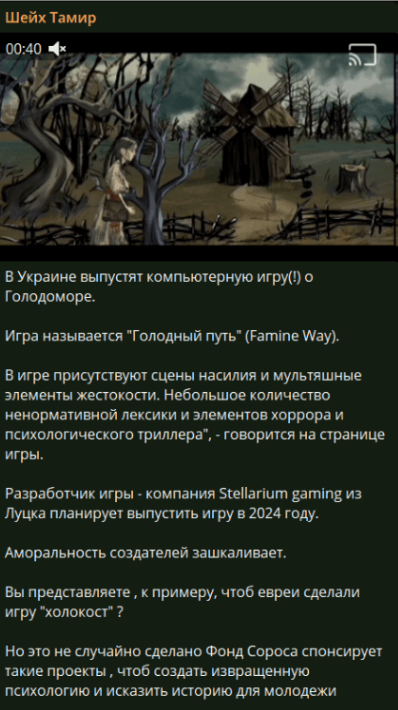Verification within Meta’s Third-Party Fact-Checking Program
A trailer for the video game about the Holodomor of 1932-1933, titled “Famine Way” from the Ukrainian studio STELLARIUM.gaming, is being circulated online. Some claim that this product is immoral and is sponsored by George Soros to “create a distorted psychology and distort history for the youth.”
“Famine Way” aims to truthfully depict the events of the Holodomor. Video games have previously addressed important and tragic historical events. In the gaming industry, there are projects about the Holocaust and wars that are used for educational purposes.
Screenshot of the post
On November 24, 2023, the Ukrainian indie studio STELLARIUM.gaming released a trailer announcement for the game “Famine Way.” The video game is scheduled to be presented on Ukraine’s Independence Day, August 24, 2024. The main character is a girl named Olenka from the village of Pereiasnivka in the Kharkiv region. After the death of her mother and younger sister, she sets out to find her father and brother, who disappeared while attempting to find food, and she also tries to secure food for herself. The creators describe the game as follows: “This game realistically portrays the events of the Holodomor and the act of genocide against the Ukrainian people in 1932-1933. The game includes scenes of violence and animated elements of cruelty. There is a small amount of profanity and elements of horror and psychological thriller.” The indie studio’s social media does not indicate that the creation of this project is funded by Soros foundations. Also, there is no publicly available information that such organizations sponsored the creation of the game.
According to the Law of Ukraine “On the Holodomor of 1932–1933 in Ukraine,” the Holodomor is recognized as the genocide of the Ukrainian people. It was committed by the Soviet Union, which denied the commission of the crime. The Russian Federation, considering itself the successor of the USSR, also does not acknowledge the Holodomor and the involvement of the authorities in its organization. In 2019, Ukrainian President Volodymyr Zelenskyi stated that from 1932 to 1933, between 4 to 8 million Ukrainians perished. The Ukrainian Institute of National Memory indicates that 3.9 million died as a result of the genocide. Some researchers, such as those from the Holodomor Museum, cite a higher number, ranging from 7 to 10 million deaths.
The representation of significant historical events in the gaming industry is not a novelty. For example, game designer Luke Bernard contributed to the creation of a Holocaust museum in the game Fortnite. Previously, he developed the video game “The Light in the Darkness,” which tells the story of a working-class Polish-Jewish family in France during the Holocaust. It was released on February 17, 2023, and is distributed for free for educational purposes.
In Poland, the game “This War of Mine” from 11 bit studios, released in 2014, has been included in the school curriculum. The game is set in a fictional country, but its developers were inspired by real events that occurred during the siege of Sarajevo from 1992 to 1995. Players control a group of civilians and must make difficult decisions, the consequences of which affect the well-being of each character. In this way, the Polish government aims to demonstrate the harsh realities of armed conflicts.
Other examples include games like “Valiant Hearts: The Great War” and “1979 Revolution: Black Friday.” The first narrates the events of World War I and presents the challenging choices the main character must make throughout the story. The latter is based on real events and depicts the 1979 revolution in Iran.
Video games have been used before to address complex topics, including the Holocaust and the horrors of war. Therefore, creating a game about the Holodomor, especially if it accurately reflects historical realities, is not unusual or immoral.
Attention
The authors do not work for, consult to, own shares in or receive funding from any company or organization that would benefit from this article, and have no relevant affiliations



